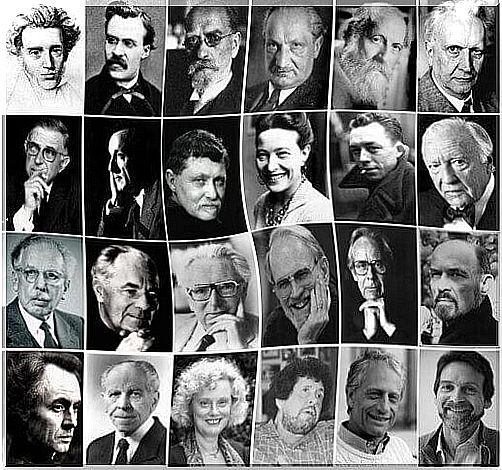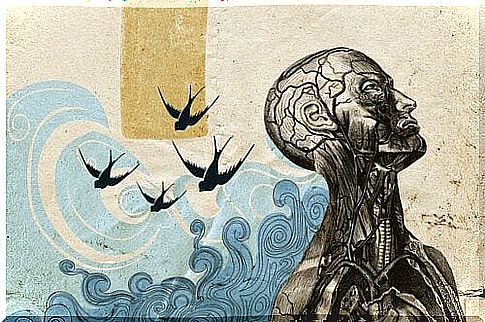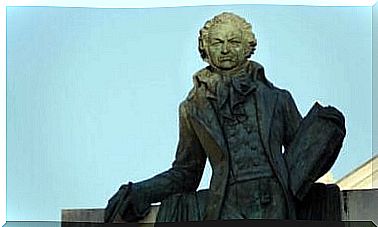Existential Psychotherapy: Nothing Is Real Until One Has Lived

Sören Kierkegaard, father of existentialism, stated: “God does not think, He creates; God does not exist, He is eternal. Man thinks and exists and existence separates thought and being, distances them from each other in succession ”. To be honest, it is the existential approach that cares about the human being. Existential psychotherapy is a current very similar to the existentialist philosophy born in Europe before the Second World War .
Shortly thereafter it reached the United States, where renowned psychologists, such as Allport, Roger, Fromm or Maslow, explicitly referred to it.
On the other hand, existential psychotherapy has strongly influenced humanistic psychology . To the point of taking up some fundamental methods and arguments.
Humanistic-existential models
Existential analysis is part of the so-called humanistic-existential models. The appearance of these models in the North American context of the sixties is the result of multiple influences. Their evolution must be contemplated in the light of their social and cultural repercussions on the North American scene first and on the European one later. Thus, their development took place on the fringes of academic psychology .
Although humanistic psychology is considered a third force with respect to behaviorism and psychoanalysis, it lacks a paradigmatic vocation. Nowadays the humanistic-existential models must be seen as a set of therapeutic procedures, for the most part detached from the main academic currents.
The main antecedents of these models are existentialism and phenomenology. The phenomenological current finds its most immediate origins in the thought of Franz Brentano, who speaks of the experience, the active character of the psyche and the programmed (and therefore intentional) nature of any psychic act. Brentano influenced the main representative of phenomenology, Edmund Husserl.
According to Husserl, the immediate experience of the cognitive act can reveal the nature of things. Hence the importance of the so-called “epoché” or phenomenological attitude. In other words, it is necessary to rely on pure observation of the phenomenon , without prejudices or a priori beliefs (before experience).

Existential psychotherapy
The central notion of this approach is that of the existential project. According to JP Sartre, existence precedes essence. This means that the human being does not come into the world with an essence to develop, but must find it for himself. Sartre considers man a completely free and indeterminate being, albeit limited by his facticity. Without it, it cannot be understood. Therefore, the human being self-determines through the existential project.
The central idea of existential analysis could be expressed with a phrase from Ortega y Gasset: to live you must always do something (even just breathe) . The goal of existential psychotherapy is to analyze the structure of life. Binswanger called this structure “Dasein”. Sartre called it an existential project.
The Spanish psychologist Villegas defined existential psychotherapy as “a method of interpersonal relationship and psychological analysis”. Its purpose would be to provoke a knowledge of oneself and sufficient autonomy to freely assume and develop one’s existence (Villegas, 1998, p. 55).
Existential psychotherapy clarifies and understands the values, meanings and beliefs that the patient has implemented (as strategies) to understand the world. It highlights the assumptions about our way of life, as we have begun to doubt the appropriation of our existence.

Psychotherapy in humanistic-existential models
From a psychotherapeutic point of view, the most relevant feature of humanistic-existential models is the importance given to immediate experience as a primary phenomenon. This implies that both theoretical explanations and manifest conduct are subordinated to the experience itself and to the meaning that the person attributes to it.
Characteristic of these models is also the emphasis on the volitional, creative and evaluative aspects of human conduct. Beyond these general characteristics, it is difficult to talk about the basic concepts.

Existential voids such as psychopathological disorders
As we have said, the central notion of existential psychotherapy is that of the existential project. The purpose of existential psychotherapy is to analyze this project and modify it. It does not claim to change the external reality, physical or social, but the person and his perception of things. It is accepted, and in a radical way, that the latter is the only element that depends on her, over which she ultimately has a greater capacity to control.
Its goal is to find the human being through self-possession and self-determination. This somehow implies putting it in front of itself.
Frequently the individual finds himself lost and alienated in the attempt to solve the problems that his radical transcendence puts before him. The purpose of analyzing the structures of his world is to discover the ways and points of alienation. Only in this way is it possible to restore basic freedom. Only in this way is it possible to allow an alternative reconstruction of his experience. According to existential psychotherapy, nothing is real until one has lived.
According to this approach, the various psychopathological disorders are considered to be inauthentic forms of existence. They are stalemates or existential voids. They are defenses or denials of “being-in-the-world”, renunciations or losses of freedom (Villegas, 1981).
It is not easy to clearly define existential psychotherapy, but we can nevertheless recognize its attempt to promote a personal analysis that motivates the possibility of choosing and building individual schemes for living . At the same time, it claims to diversify and enrich a person’s daily life through a philosophical provocation.









